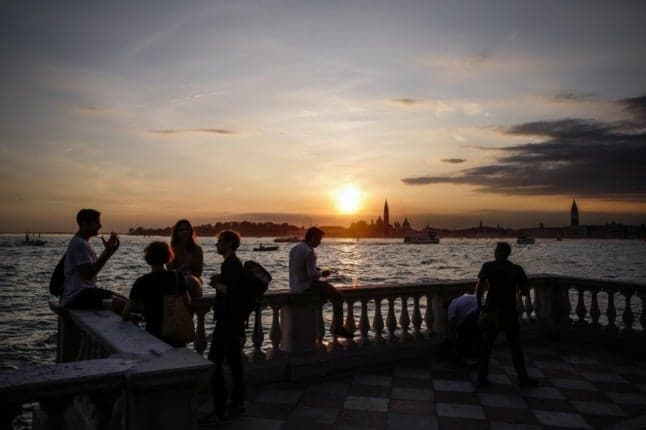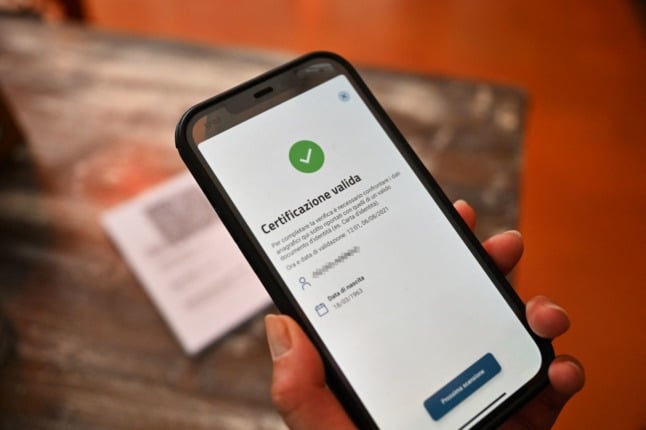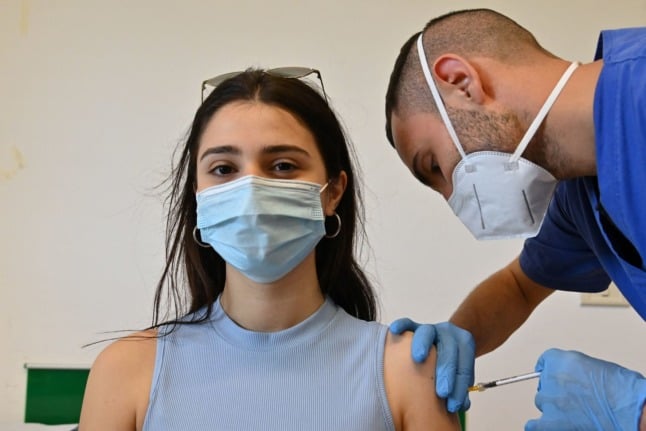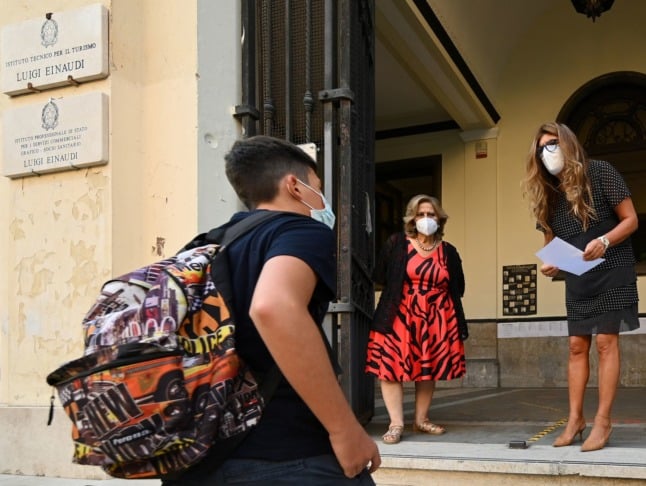What changes about life in Italy in September 2021?

From the expanded ‘green pass’ requirements to the return to school, here are the changes September 2021 will bring to Italy.
The long, hot Italian summer is now coming to an end and the rientro is imminent. As the country gets moving again in September, there are plenty of changes in store.
Some are confirmed, others still speculative, but each of the following may have an impact on your life in Italy soon.
Here’s what to be aware of in the coming weeks.
Covid 'green pass' expansion
Proof of vaccination, testing or recovery via the certificazione verde or ‘green pass’ scheme has been required since August 6th in order to enter many cultural and leisure venues across Italy, including museums, theatres, gyms, and indoor seating in restaurants.
From September 1st the health pass will also become a requirement for teachers and other school staff, as well as on long-distance public transport including interregional trains and domestic flights.
Q&A: Your questions answered about Italy’s Covid health pass
For schools, this is a key part of the government's strategy to ensure that pupils can learn in person, after constantly changing Covid restrictions kept them in and out of classrooms for much of the past 18 months - though some details remain to be finalised, such as who’ll be checking all those certificates every day.
The government is also considering a further expansion which would make the pass mandatory for employees at workplaces deemed essential, including public offices and supermarkets.

Photo: Andreas SOLARO / AFP
Some Italian regions risk new Covid restrictions
As of August 30th, Sicily became the first Italian region to be placed under yellow zone restrictions once more as new weekly cases and Covid hospitalisation rates rose.
Until then, all of Italy's regions had been classified as a low-restriction 'white zone' since the end of June.
More regions are thought to be at risk of having restrictions re-imposed in the coming weeks. Calabria, and Sardinia are currently thought to be at the highest risk of moving into the yellow zone.
Yellow zone restrictions require that masks are worn in all public spaces, including outdoors, and that restaurants may only seat a maximum of four people per table (unless the group is co-habiting) though indoor dining is allowed, according to the Health Ministry.
However there is no evening curfew, and travel between Sicily and other Italian regions is not restricted.
'Decisive' month for vaccination campaign
The number of Covid-19 vaccines administered in Italy throughout August was up to 60% lower than in July. But despite the summer slowdown, authorities remain confident about meeting the goal of vaccinating 80 percent of the eligible population by September 30th.
Health ministry officials said this week that September "will be decisive" for the vaccination campaign, as the numbers of vaccinations and appointment bookings in the coming weeks should give a clearer understanding of how many people in Italy are refusing the vaccine.
Vaccination coverage by the end of the month will inform the health ministry's decisions on whether and how to enforce new health measures if the infection rate continues to rise.

Photo: Alberto PIZZOLI / AFP
Schools return with mask requirements and distancing measures
The start of the school year will be staggered across Italy's regions, with schools in South Tyrol the first to reopen on September 6th, followed by re-openings in Abruzzo, Basilicata, Emilia Romagna, Lazio, Lombardy, Piedmont, Trentino, Umbria, Valle d'Aosta and (elementary and middle school only) Veneto on September 13th; Sardinia on September 14th; Campania Liguria, Marche, Molise and Tuscany on September 15th; Friuli Venezia Giulia, Sicily and (high school only) Veneto on September 16th; and Calabria and Puglia bringing up the rear on September 20th.
Students from the age of six will still be required to wear masks in the classroom this year, while in nurseries and kindergartens only teachers will be need to be masked. Schools are expected to distribute masks to both staff and students.
EXPLAINED: What parents in Italy should know about new Covid rules in schools
To keep crowds to a minimum, only one parent will be allowed to accompany their child directly outside the school building for drop offs and pick ups, and schools will have separate designated entrance and exit zones.
In the event that a teacher or student tests positive for Covid, a quarantine of seven days will be triggered for classmates who are vaccinated, and ten days for the unvaccinated, with affected students moving to distance learning.

Photo: Vincenzo PINTO / AFP
Changes to the rules on travel from some non-EU countries
Rules for travel to Italy have changed in response to the developing coronavirus situation. The Italian health ministry’s new travel ordinance came into force at the end of August, tightening restrictions on travel from some countries, and lifting them for others.
New restrictions on arrivals from the US, Canada, Japan and Israel mean they must now show proof of vaccination AND testing.
Meanwhile the quarantine rule for UK travellers was lifted, providing they can show proof of vaccination and testing.
Find more details here about the major changes to be aware of if you're visiting or returning to Italy in September.
New travel restrictions for EU citizens travelling to the UK
September 30th will be the last day that EU citizens will be allowed to enter the UK using their EU identity cards, unless they meet certain criteria such as having settled or pre-settled status under the EU Settlement Scheme or having a frontier worker permit.
If you are travelling to the UK with an Italian partner, friend or relative from October 1st onwards, remind them that they will need a passport.
Comments (1)
See Also
The long, hot Italian summer is now coming to an end and the rientro is imminent. As the country gets moving again in September, there are plenty of changes in store.
Some are confirmed, others still speculative, but each of the following may have an impact on your life in Italy soon.
Here’s what to be aware of in the coming weeks.
Covid 'green pass' expansion
Proof of vaccination, testing or recovery via the certificazione verde or ‘green pass’ scheme has been required since August 6th in order to enter many cultural and leisure venues across Italy, including museums, theatres, gyms, and indoor seating in restaurants.
From September 1st the health pass will also become a requirement for teachers and other school staff, as well as on long-distance public transport including interregional trains and domestic flights.
Q&A: Your questions answered about Italy’s Covid health pass
For schools, this is a key part of the government's strategy to ensure that pupils can learn in person, after constantly changing Covid restrictions kept them in and out of classrooms for much of the past 18 months - though some details remain to be finalised, such as who’ll be checking all those certificates every day.
The government is also considering a further expansion which would make the pass mandatory for employees at workplaces deemed essential, including public offices and supermarkets.

Some Italian regions risk new Covid restrictions
As of August 30th, Sicily became the first Italian region to be placed under yellow zone restrictions once more as new weekly cases and Covid hospitalisation rates rose.
Until then, all of Italy's regions had been classified as a low-restriction 'white zone' since the end of June.
More regions are thought to be at risk of having restrictions re-imposed in the coming weeks. Calabria, and Sardinia are currently thought to be at the highest risk of moving into the yellow zone.
Yellow zone restrictions require that masks are worn in all public spaces, including outdoors, and that restaurants may only seat a maximum of four people per table (unless the group is co-habiting) though indoor dining is allowed, according to the Health Ministry.
However there is no evening curfew, and travel between Sicily and other Italian regions is not restricted.
'Decisive' month for vaccination campaign
The number of Covid-19 vaccines administered in Italy throughout August was up to 60% lower than in July. But despite the summer slowdown, authorities remain confident about meeting the goal of vaccinating 80 percent of the eligible population by September 30th.
Health ministry officials said this week that September "will be decisive" for the vaccination campaign, as the numbers of vaccinations and appointment bookings in the coming weeks should give a clearer understanding of how many people in Italy are refusing the vaccine.
Vaccination coverage by the end of the month will inform the health ministry's decisions on whether and how to enforce new health measures if the infection rate continues to rise.

Schools return with mask requirements and distancing measures
The start of the school year will be staggered across Italy's regions, with schools in South Tyrol the first to reopen on September 6th, followed by re-openings in Abruzzo, Basilicata, Emilia Romagna, Lazio, Lombardy, Piedmont, Trentino, Umbria, Valle d'Aosta and (elementary and middle school only) Veneto on September 13th; Sardinia on September 14th; Campania Liguria, Marche, Molise and Tuscany on September 15th; Friuli Venezia Giulia, Sicily and (high school only) Veneto on September 16th; and Calabria and Puglia bringing up the rear on September 20th.
Students from the age of six will still be required to wear masks in the classroom this year, while in nurseries and kindergartens only teachers will be need to be masked. Schools are expected to distribute masks to both staff and students.
EXPLAINED: What parents in Italy should know about new Covid rules in schools
To keep crowds to a minimum, only one parent will be allowed to accompany their child directly outside the school building for drop offs and pick ups, and schools will have separate designated entrance and exit zones.
In the event that a teacher or student tests positive for Covid, a quarantine of seven days will be triggered for classmates who are vaccinated, and ten days for the unvaccinated, with affected students moving to distance learning.

Changes to the rules on travel from some non-EU countries
Rules for travel to Italy have changed in response to the developing coronavirus situation. The Italian health ministry’s new travel ordinance came into force at the end of August, tightening restrictions on travel from some countries, and lifting them for others.
New restrictions on arrivals from the US, Canada, Japan and Israel mean they must now show proof of vaccination AND testing.
Meanwhile the quarantine rule for UK travellers was lifted, providing they can show proof of vaccination and testing.
Find more details here about the major changes to be aware of if you're visiting or returning to Italy in September.
New travel restrictions for EU citizens travelling to the UK
September 30th will be the last day that EU citizens will be allowed to enter the UK using their EU identity cards, unless they meet certain criteria such as having settled or pre-settled status under the EU Settlement Scheme or having a frontier worker permit.
If you are travelling to the UK with an Italian partner, friend or relative from October 1st onwards, remind them that they will need a passport.
Join the conversation in our comments section below. Share your own views and experience and if you have a question or suggestion for our journalists then email us at [email protected].
Please keep comments civil, constructive and on topic – and make sure to read our terms of use before getting involved.
Please log in here to leave a comment.